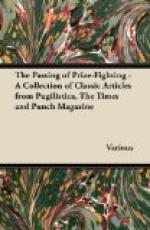“My years excuse me from choric exercises,” said the Sage. “And, anyhow, it doesn’t take me that way.”
“Then you are not in the movement. You are not in touch with the spiritual pulse of our throbbing Metropolis; you take no active part in the New Life that is springing from the seed of England’s sacrifices. True, your years, as you say, are against you, however well you wear them: it is to the young that we look first for signs of the great Regeneration. And in particular we look to those who are to be the mothers of that future race which should reap the full harvest of our blood and tears.
“And what do we find?” continued the Cynic. “We find a contempt for the old virtues of simplicity and reticence; we find the distinction of sex wiped out, and with it all reverence and sense of mystery. Nature is a back number with them; they must for ever be plastering their noses with powder—not just privily, as used to be the better way of faded charmers, but shamelessly in public places. In dress they barely keep within the bounds of decency prescribed by the police. They make their own advances, rounding up and capturing their ‘boys’ for partners, lest the haunts of jazzery should be closed against them. And in this competition for their favours the good modest fellows who only a little while ago were fighting our battles for us are now giving themselves the airs of spoilt beauties. What do you make of all this in your scheme of Renaissance?”
“I admit much of what you say,” said Mr. Punch, “but I ascribe it, in part at least, to a natural reaction from the strain and horror of War.”
“’Reaction’!” snorted the Cynic. “A very comfortable word. But what were the sufferings from which they are ‘reacting’? The loss, you will say, of the flower of our chivalry in battle? Well, one would think that might have steadied them. Is this what our manhood died for—to make a British carnival?”
“I don’t pretend to understand that side of it,” said the Sage, “but I know that during the War we respected the silence of their grief; and I know that nature must choose its own way of recovering from a loss and reasserting its claim to happiness. Remember, too, that War must always have its demoralising features, however splendid the cause for which you are fighting. ‘Let us eat and drink, for to-morrow we die,’ says the soldier in his brief intervals of release. And some of us at home went more than half-way to meet him, imitating an attitude excusable in him but not in us. And that attitude is bound to survive for a little time the causes that induced it. But you must not forget that many of the type which you are now attacking did noble work in the War; and they will do it again.”
“That may be,” said the Cynic; “but is it necessary to have an orgy of Carmagnole in between?”




